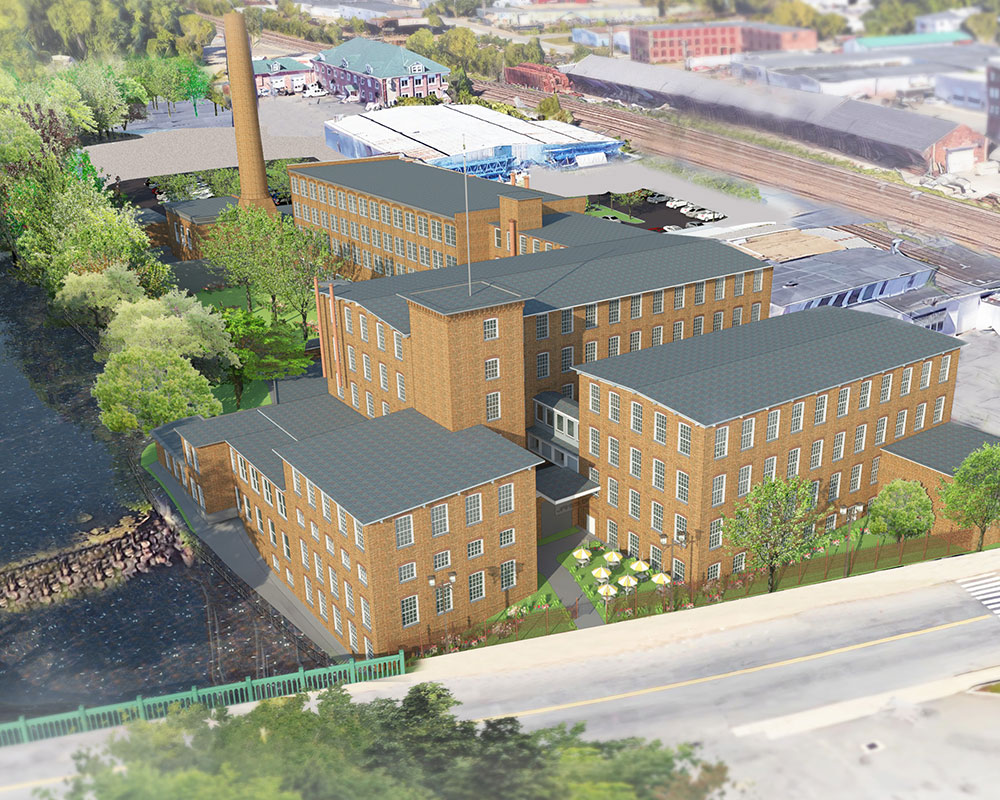Architect’s rendering of proposed redevelopment of former factory buildings near Lafayette Square.
The state has given Haverhill its blessing to proceed with as many as 700 housing units in a blighted and fire-ravaged section of the city, near downtown.
An extension of the existing downtown Smart Growth Overlay District, crossing Winter Street onto Stevens Street, received a letter of approval recently by the state Department of Housing and Community Development, Mayor James J. Fiorentini said Thursday.
“Providing our residents with housing is a critical goal that has always been on my administration’s agenda. Reusing buildings around Haverhill such as the Stevens Mill is an excellent way to create space for new residents and businesses,” the mayor said.
This past May, city councilors approved a special permit for Winn Development to construct 82 apartments and a restaurant on the Pentucket Mills site, 14 Stevens St. Following further approvals, the expanded district would allow 701 units to be built.
WHAV first reported plans for the overlay district nearly two years ago. At the time, Economic Development and Planning Director William Pillsbury Jr. told Haverhill city councilors the extension of the downtown district across Winter Street would allow “residential, residential/mixed use commercial and performing arts-related uses” on the western, or Little River, side of Stevens Street.
Earlier redevelopment plans were placed in doubt when a September, 2015, eight-alarm blaze destroyed the former Hudson Machinery Company, 14-30 Stevens St. Four teenagers, including two 15-year-olds, a 14-year-old and a 16-year-old, were ultimately convicted of arson.
Extending development to the Little River area has long been a vision advanced by Fiorentini. In his 2016 State of the City address, the mayor announced plans for a $30 million redevelopment project at the former Stevens Mills building.
Under the state’s Smart Growth Zoning Overlay District Act, communities allowing dense residential or mixed-use projects are eligible for payments from a Smart Growth Housing Trust Fund, as well as other incentives.

700 units!!!!!! How many new students does that add in the Haverhill school? Lets say .75 student per unit thats over 500 new students…can you say new additional school with new teachers!!!!! Lets say 4K per unit in r/e taxes x 700 units = $2,800,000.00 in new tax revenue. Now figure 16K per child x 500 students and that = $8,000,000.00 in expenses for a loss of 5.2 million dollars a year that taxpayers will have to foot in new taxes. Good luck Haverhill!
Just think the taxpayers will also help pay to remodel the building and clean up the contaminated ground. Our great mayor will also give them a 10 year tax break. Same deal as the Harbor place
Obviously, no one did an impact study. That area can’t support 700 housing units.
What I find interesting is that when the Mayor wanted the pot dispensary to be located on Hale st., right around the corner, opponents correctly pointed out the traffic impact in that area would very high. Now, they approve 700 apartments, which has an impact of 1.5 vehicles per residence ?? What about the school system being impacted once again by these huge developments ? The money hungry Mayor strikes again !